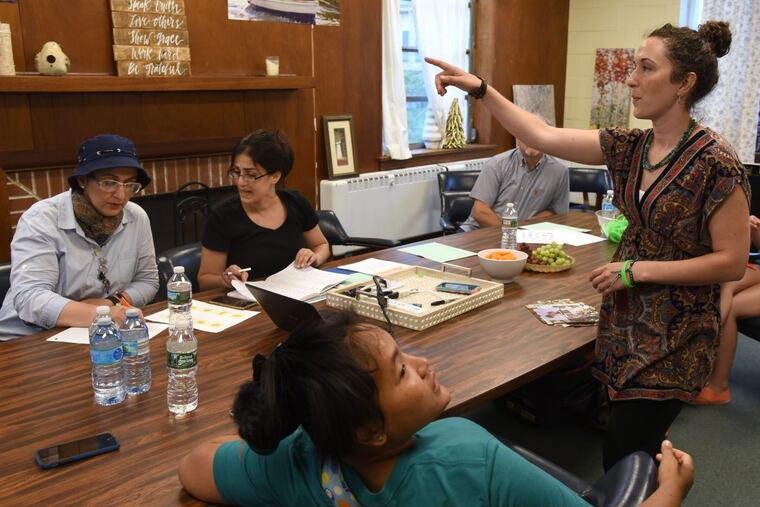Many words in English, all saying 'welcome' to these immigrants in South Jersey
One sign advertising the ESL classes was vandalized, and a customer at the Haddon Heights Farmers Market, where the organization occasionally sets up a booth, suggested that Crossing the Gap best not be signing up refugees for Medicaid.

Rawnak Saaeed, Rola Hanan, and Maria Cinhoihniang — refugees from Iraq, Syria, and Myanmar, respectively — listen carefully to Alison DiGiacomo's questions.
"Do you see this guy? Where is he?" she asks, referring to a cartoon figure in a cartoon house on the monitor.
"He's on the steps. Just like my hand is on the table," says DiGiacomo, tapping the furniture for emphasis.
"You also say, 'step by step,' " Saaeed observes brightly.
Welcome to a conversational English class sponsored by Crossing the Gap, an all-volunteer program DiGiacomo launched in May to help refugees and immigrants assimilate in South Jersey.
"I saw there was a need, and I took some steps toward meeting that need," explains DiGiacomo, 28, a treatment coordinator at a Collingswood dental practice and a member of the borough's Fellowship Community Church.
The nondenominational Christian congregation on Collings Avenue supports Crossing the Gap and provides facilities for the English classes and other activities, such as the International Luncheon ("Come out and meet your new neighbors!") set for 12:30 p.m. Sunday.
"I have a great appreciation for what it feels like to be in a totally other world and have to find a restroom. Or make phone calls, or get an appointment," says DiGiacomo, of Haddon Heights. She grew up in New Gretna, Burlington County, learned Spanish while living in Mexico, and has done missionary work in Asia.
"Families come here, and [they're] all they have. I have great compassion for how isolated they feel," she says, "We focus on words they can use in their daily lives."
On a recent Monday evening, DiGiacomo got the room at Fellowship Community ready with the help of her boyfriend, Chris Latorre, of Blackwood, and volunteers Bill and Carolyn Strasle, who live in Audubon.
"The students just want to talk to you, and for you to talk to them, in English," Carolyn says. "They want to learn the nuances of conversation."
Generally, anywhere from a handful to a roomful of students show up for the once-a-week class. Many are recent arrivals to the United States, speaking primary languages such as Spanish, Arabic, Burmese, and Urdu.
DiGiacomo works closely with the Diocese of Camden's Catholic Charities office of Refugee and Immigration Services. The office is a leading agency in the local resettlement of refugees and immigrants from Syria, Iraq, Myanmar, and other nations disrupted by war or sectarian strife.
"Alison took the initiative," Patrick Barry, director of the Camden office, writes in an email.
"Community partnerships are a vital aspect to serving refugees. … A refugee resettlement program is only as successful as the community that supports it."
Despite President Trump's confrontational tone about refugee and immigration matters — all that boasting and bellowing about building walls — Crossing the Gap has been generally well-received.
One sign advertising the ESL classes was vandalized, and a customer at the Haddon Heights Farmers Market, where the organization occasionally sets up a booth, suggested that Crossing the Gap best not be signing up refugees for Medicaid.
But volunteers like church member Jamie Faith have been inspired to get involved in part because of anti-immigrant rhetoric; she also is motivated to "share the love of Christ" with people in need.
"I want to be another set of hands," says the 36-year-old Haddon Township resident, who certainly had her hands full with the little ones she was looking after down the hall from the classroom where their mothers were learning English. "I wish I could do more."
Saaeed, 38, Hanan, 33, and Cinhoihniang are married mothers with three children each; Saaeed says employment is her family's greatest challenge. She and her husband, Firas, both worked for universities in Baghdad, she as a secretary, he as an instructor.
"Every interview tells my husband he needs a certificate," says Saaeed, who lives in Audubon.
"His [resume] is high quality, I can show you. He has been driving for Uber and substitute teaching, but the income is not good."
But Saaeed, like her classmates, says she feels welcome in America, is glad to be here, and wants to volunteer with Crossing the Gap.
"It's the coolest thing — the refugees who speak more English want to be involved. They want to give back," says DiGiacomo, who accepts free-will offerings but pays for food and other expenses to help get her organization off the ground.
The magnitude of the global refugee crisis and the domestic political controversy about who, and how many, ought to be allowed into the United States can seem overwhelming and discourage people who want to volunteer from doing so, she notes.
"I look at the faces of the people who are in front of me," she says. "We're learning from each other, we're working together, and we're trying to find a middle ground.
"If we can help a handful of people's children to grow and succeed, then we've done something."